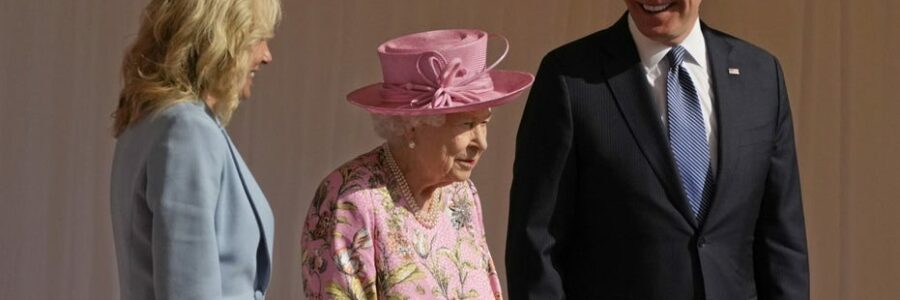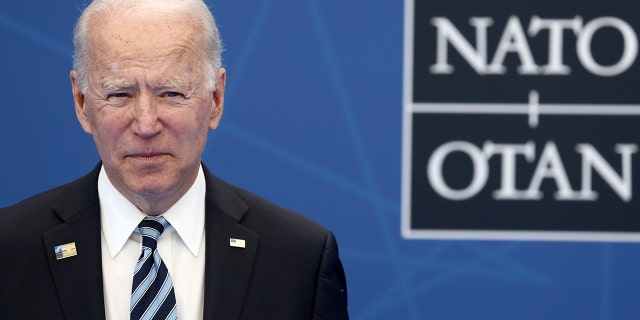
Biden reaffirms US commitment to NATO, cites 'new challenges' with Russia, China
President Biden meets Queen Elizabeth II for first time
Joe Biden becomes the 13th serving U.S. president the queen has met; Greg Palkot reports from Windsor.
President Biden on Monday said NATO is “facing new challenges,” specifically referring to Russia and China, while maintaining that the NATO alliance is “essential” and “critically important” for U.S. interests.
From NATO headquarters in Brussels Monday, the president maintained that the United States is looking to have a “stable and constructive” relationship with Russia, while assuring that the U.S. will always “respond” in the face of Russia’s harmful activities, and will always defend its allies.
“I think there is growing recognition, over the last couple of years, that we have new challenges,” Biden said. “And we have Russia that is not acting in a way that is consistent with what we had hoped, and – as well as China.”
NATO Secretary General Jens Stoltenberg, joining the president, said the meeting comes “at a pivotal time” for NATO, and previewed discussions on the threats both Russia and China pose.
U.S. President Joe Biden arrives for a NATO summit at NATO headquarters in Brussels, Monday, June 14, 2021. (Kenzo Tribouillard, Pool via AP)
(Kenzo Tribouillard, Pool via AP)
“I think that the Allied leaders look forward to consulting with you ahead of the meeting with President Putin,” Stoltenberg said, referring to Biden’s meeting on June 16 with Russian President Vladimir Putin in Geneva, while adding that allies would also address China.
“We all recognize that China’s heavy investments in military capabilities, continued coercive behavior, and their growing influence matters for our security,” Stoltenberg said. “And we need to respond to that as an Alliance.”
“A strong NATO is good for Europe, but it is also good for America,” Stoltenberg added.
“It’s very good for America,” Biden said. “It’s essential for America.”
Stoltenberg added that “no other major power has as many friends and allies as United States has in NATO.”
“I know that we can count on America and that America can count on Europe,” Stoltenberg said.
“I want to make it clear: NATO is critically important for U.S. interests in and of itself,” Biden said. “If there weren’t one, we’d have to invent one.”
The president added that NATO has allowed America to “conduct its business around the world in a way that never would have occurred were it not for NATO.”
“I just want all of Europe to know that the United States is there,” Biden said. “The United States is there.”
National security adviser Jake Sullivan said Biden’s overriding objective at NATO would be sending a clear message to both allies and adversaries that the U.S. regards NATO as the foundation for U.S. security. Biden will also send a message that NATO’s Article 5, which states that an attack on one member is an attack on them all, is a “sacred guarantee,” according to a statement by the White House.
Cyber defense and the climate are among the topics being discussed at the summit.
During the NATO summit, the president is also expected to discuss with allies “effective burden-sharing,” as part of his overall pledge to revitalize U.S. relations with members of the alliance, following tensions under the Trump administration.
Former President Trump argued throughout his administration that NATO members were not contributing enough in defense spending.
In March, NATO disclosed that 11 member nations spent at least 2% of their gross domestic product (GDP) on defense in 2020, up from three nations in 2014. NATO’s European member nations and Canada spent 3.9% more in real terms from 2019 to 2020.
NATO set a goal for all members to hit the 2% spending benchmark by 2024. Secretary of State Antony Blinken previously signaled that the Biden administration would continue to push NATO allies to increase their defense spending.
Meanwhile, on the sidelines of the NATO summit, Biden met with leaders of the three Baltic countries, Estonia, Latvia and Lithuania, and had the chance to discuss and coordinate in advance of his meeting with Putin. Biden and the leaders discussed the threat that Russia poses to NATO’s “eastern flank,” according to Biden administration officials, and also discussed the “collective defense to coordinate on the resilience of those states in the face of multiple dimensions of the threat posed by Russia, from cyber to provocative military exercises on their borders, to information warfare.”
An administration official said Biden was able to “communicate to them what he has communicated publicly – which is that the United States wants a stable and constructive relationship with Russia, but also will respond in the face of Russia’s harmful activities and will always stand up for NATO allies.”
Biden and Putin are expected to discuss a range of issues, including Iran and North Korea’s nuclear capabilities, Syria, the Arctic, strategic stability, arms control, climate change and COVID-19.
The U.S. and Russia have long competed on a global scale, and where the U.S. exceeds Russian capabilities, as in the case with the U.S. military, Putin has relied on other factors to bolster Russian dominance – including cyber-strikes.
Meanwhile, Biden and Putin are also expected to again discuss the intent of the U.S. and Russia to pursue a “strategic stability dialogue on a range of arms control and emerging security issues” to build on the extension of the New START Treaty, according to the White House. The START Treaty places verifiable limits on all Russian deployed intercontinental-range nuclear weapons. The treaty began on Feb. 5, 2011, and according to the State Department, the U.S. and the Russian Federation have agreed to extend it through Feb. 4, 2026.
Biden is also expected to raise the issue of Russia-based ransomware attacks with Putin during their June 16 summit in Geneva.
As for China, Biden has been discussing with leaders the “emerging security challenges” posed by China, including in the domain of technology.
Source: Read Full Article


